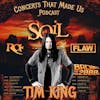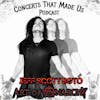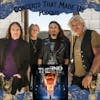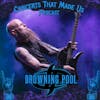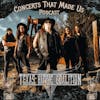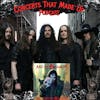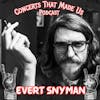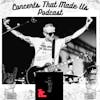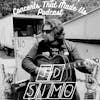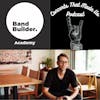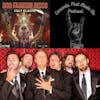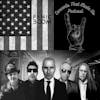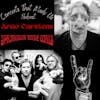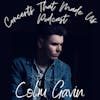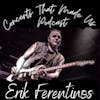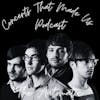
Jason Horseman - Gage

On this episode Brian is joined by Jason Horseman from Gage.
Gage hails from the historic and dusty diamond mining town of Kimberley, South Africa. Founded by frontman, drummer, singer and songwriter, Jason Horseman in 2007, the band has performed at several local and international festivals to growing numbers of fans.
Five years in the making, ‘World Below You’ was Recorded at B-Sharp Studios and mixed by Theo Crous (Springbok Nude Girls) at his Bellville Studios. The album covers themes of loss, the turmoil of the global pandemic and traversing tragedy to rise again from the depths. Jason
Horseman, personally lost his Father in 2019 and in 2022 also lost his fiancé who tragically succumbed to Covid-19 leaving Jason and his 8-year-old son behind. ‘World Below You’ is an album of classic, powerful and relatable rock songs that formed part of Jason’s catharsis and
reset.
The album was mixed in 2022 by Theo Crous who also co-wrote the song ‘Baby B”, as well ascontributing to string arrangements and bass and guitar layers to several of the songs. The album also features appearances from several seasoned South African musicians such as guitarist Mark Buchanan (ex Max Normal, Just Jinger), Theo Janse van Rensburg (arrangements, bass, and guitar). Jasper ‘Jazz’ Janse van Rensburg (bass), and Llewellyn Friend (guitar.)
Find Gage here:
https://gage.co.za/
https://www.facebook.com/GAGERockBand/
https://www.instagram.com/gage_band/
Find CTMU here:
https://linktr.ee/Concertsthatmadeus
Newsletter: https://concertsthatmadeus.aweb.page/p/f065707b-2e34-4268-8e73-94f12bd2e938
If you would like to support the show you can do so by rating/reviewing us on Itunes and Spotify or by signing up at https://www.patreon.com/Concertsthatmadeus
Save 10% on Band Builder Academy membership by following this link https://bandbuilderacademy.com/Brian_Concerts/join and using promo code "concerts" at signup.
Become a member at https://plus.acast.com/s/concerts-that-made-us.
Hosted on Acast. See acast.com/privacy for more information.
Jason: Hi, this is Jason here from Gage and you're listening to Concerts That Made Us.
Brian: Jason, you're very welcome to concerts that made us.
Jason: Oh, thank you so much for having me, man.
Brian: It's great to have you. I'm looking forward to getting some insights into your music, especially the upcoming album now. So we kicked off the show with Baby B. It's off the upcoming album World Below You, which is released on the 7th of April. Can you tell us a bit about the track?
Jason: Um, yeah, the track was basically written for, um... My ex-fiance, she passed away due to COVID two years ago. So the song, basically was written for her. Yeah.
Brian: I see. I see. It was co-written with Theo from Springbok Nude Girls. He also mixed the album. What was it like working with Theo?
Jason: Theo Crous is absolutely such an amazing producer and engineer. He's world-class, he's got the world of experience and he's also recorded so many artists over in South Africa which have really made it very, very big. A lot of these bands are touring all over the world and he's recorded so many of these bands' albums. For example, like Prime Circle, Parlotones, Dan Patlansky. I don't know if you've heard of a blues guitarist called Dan Patlansky from South Africa. He's recorded Dan Patlansky's albums and he's recently just got back from Los Angeles. He recorded a band in LA and he played a couple of songs to the Americans of our new stuff and they really enjoyed it. Be very nice to actually maybe go to Nashville and see what we can do. That'll be fantastic. But Theo is an absolutely such an amazing guy and his skills are just unbelievable.
Brian: Yeah, yeah, definitely. I actually, I suppose like a lot of people, I knew him through the Springbok Nude Girls and when I found out that he actually mixes and masters music as well, I was just amazed and like as you mentioned, finding out who he has worked with in that regard. It's unbelievable.
Jason: No, for sure. He's really, really, I am so glad that we went to Theo for this new album. He mixed the album so nicely. And then, because we actually took, originally we took five songs for mixing to him. And then we decided, you know what, we're going to just, let's just do a full length album. So Theo and myself, we co-wrote Baby B together, and he played some extra guitars on some of the other tracks and mixed them so beautifully and he did some nice instrumentation on the tracks and stuff. He played some bass guitar and some acoustic guitar in some of the tracks and some electric guitars. So, you know, the album is rich with some very good talent on the album, yeah.
Brian: The album deals with some very dark themes. What was it like channeling so much tragedy into the music?
Jason: Well, you know, the majority of the album was also I also lost my dad about three years ago. My dad passed away and my dad never ever got to hear any of the songs that we wrote. So "World Below You" was actually also a tribute to my to my late father. So, you know, there's a whole lot of mixed emotions throughout the album. But there are also, I must say, there are some very positive songs in the album as well. For example, like a song called Rise that we did. It's a very inspirational song. And it's, you know, it's the lyrics are very, very positive. And it gives hope as well to a lot of people.
Brian: It's been five years in the making, how does it feel to finally be getting it out and let people hear it?
Jason: Oh man, at times I was so frustrated because I thought, oh, you know, it's never going to get there, never going to get there. Initially, the album started off with a guy called Theo Jansser von Rendsburg. He produced our previous albums and he actually emmigrated to Spain. So then we were basically, this is like throughout middle of the album, then we had to change producers. We eventually ended up with JP from B-Shop Studios in Johannesburg, Boxburg. He recorded and checked some of the songs and those were five songs. So we wanted to originally release a five track EP but then I wasn't really convinced that it's 100% the sound that we're looking for. We wanted to go for slightly harder sound, some bigger guitars, a little bit more aggressive kind of sound. And that's when I contacted Theo and I said to Theo, would you be willing to remix the five songs? And then it just started becoming such fun. And then eventually we sat down and we said, you know what? Oh, I think let's just release a full-length album. Then I went back to the drawing board in my little hometown, Kimberley and I started doing some pre-production on some new songs and I was exchanging some of the ideas to Theo and that's how it went. I spent a lot of times, actually quite a few months actually going up to Cape Town to Theo and he was so cool about it. You know, we would just grab two acoustic guitars and Theo would say to me, okay, play the riff, let me hear, what have you got? Then he would add his little bit and that's how the songs actually developed, especially Baby B. It took such a lovely turn actually. So, yeah, that was fun, but it was a long time. It was frustrating at times, but I think also we didn't just rush the album for the sake of just putting an album out there. We were selective on the songs. We chose the songs carefully and the production is very, very good. So yeah, I think that it was worth the wait.
Jason: Are you guys the type of musicians now that once the album is done and it's out, you're straight onto the next one or do you kind of let the music settle for a bit before you think about the next next project?
Jason: There's always, if a person really looks at the history of of Gage, there's always been like a two, three year gap between the albums. This one's obviously a little bit longer. But I think it's quite nice to be able to have this album do its thing on radio and perform the songs live. I think it's also important to really start with some new material and try and look at another album already, you know what I mean? So that you've got a nice backup again for something new again.
Brian: True, true and as well as Theo the album features some other well-known South African musicians. How did you go about wrangling so many of them onto the one album?
Jason: One of my best friends, Mark Buchanan, we used to play in a couple of projects in Kimberley in our little hometown many years ago. And since then, when Mark moved up to Johannesburg, he played with some well-known bands like Just Ginger and Max Normal, which later became Die Antwoord. And if you've heard of a band called Die Antwoord.
Brian: It sounds familiar. All right.
Jason: Yeah, they were actually a very big South African export. And they made it very big. Mark used to be the bass player for that band, for Max Normal. And, you know, we've been friends. We were little babies. We were little babies in nappies already together. So, and Mark is such an incredible guitar player. I asked him, I said to him, there's this beautiful acoustic track that we want to do and he's got so much feel and he plays with so much color and just passion. So I asked him to play on the one track. And then there was the bass player, Jasper Jansser van Rensburg. He's practically played on all our albums, our session bass player. So basically I've been using him all these years to play on the album. Then I met up with a guy called Llewellyn Friend. There was a certain time where our guitar player actually left the band, our original guitar player. He left for a little while and that's when I actually just got hold of Llewellyn and I said to him, hey man, would you be keen on maybe joining the band and I wanna go into the studio and record some stuff. And he was like, yeah, let's do it. So he featured on three of the songs of the new album. And as I said, Mark played on some of the songs on the album. And then Theo Crous checked some guitars and some acoustics and some piano parts and bass parts. So I think there's a nice beautiful thread throughout the album where you can hear some very tasteful playing throughout the musicians.
Brian: At this point In the interview, I usually like to dive into my guests history when it comes to music. So if you can now, can you remember your earliest musical memory?
Jason: Oh, that's such a long time ago. You mean that you mean the first, maybe the first band or the first song that I really, really, really said, this is why I've become a musician. I was very influenced by U2. Um, I used to listen to U2 all the time. Um, when I was 13 years old, I was already playing in pubs. I had friends that were quite a few years older than me. Uh, we had a band called still roses and these guys were very big into U2 and they would like drop cassettes off at my house and say, Hey, Jason, I think you should learn Sunday, Bloody Sunday. I think you should learn it, so basically we did a lot of U2 covers and we were really fascinated with this band. So that is my experience with starting as a musician myself. That's what I used to listen to.
Brian: Growing up, did you grow up in a musical household? Was there lots of support for music in your home?
Jason: My dad used to be a fantastic vocalist. My dad and my uncle had a band for many many years so I would go and my mom would put me in the little carry cot right next to the speakers at the gigs and then I would fall asleep listening to my dad sing all the golden oldies and I just basically grew up I used to go to all my dad's little band practices and then I would sort of get a feel for the drums and then eventually they let me like play drums, you know, like on one or two songs at the gigs and that's how I really got into it. But I mean, I was very influenced by my dad and my uncle.
Brian: I'm always saying, you know, your teenage years are kind of always intertwined with music. You know, you find your community, through music and so many teenage experiences are linked to songs for people. What kind of music were you exposed to by your peers during your teenage years and how do you think it molded you into the musician you are today?
Jason: My dad is a huge Beatles fan and a Rolling Stones fan and the Bee Gees, my dad used to love the Bee Gees as well. I was really fascinated. One thing that gripped me those years, I think especially in the 60s and the 70s, a lot of those bands used to have such nice harmonies. And I think there was no auto-tuning those years. Those guys are like, you know what I'm saying? They used to go into the studio and actually just play. And if it wasn't like that, to just record the whole song over again, there was no sort of cutting and pasting and auto-tuning but also the harmonies, I was very fascinated with harmonies. Even the bands like The Hollies, I admired their songwriting. And I thought the songwriting, those bands were writing good songs. And I remember listening to those songs, like, when we used to go on fishing trips, my dad used to drive this old Opel Kadet and my dad used to put on like the Bee Gees and the Rolling Stones. I think those were like very strong influences. I used to listen to a lot of that. I was exposed to that as a youngster.
Brian: Yeah, some great ones there. I wasn't expecting the Beatles or the Bee Gees now. But good ones. Good ones. You can't beat the Beatles. As a concert goer yourself, what concerts would you say have made you?
Jason: My favorite band of all time has got to be A-ha. I really love them. I was very fortunate to watch them in 2018 or 2019. They performed in South Africa. And I was blown away with them. And I've watched U2 twice. I've watched Sting in South Africa. Spin Doctors, all those bands. But I think my biggest thing was, A-ha, they blew me away as a live act. It was so good.
Brian: That's actually a first now on the podcast that they've ever been mentioned. I've always taught myself I wouldn't mind seeing them. They're kind of one of them bands that for me anyway, are always in the background. You know, when they come on, you know their songs. You don't know how you know them, but you know them and you like them.
Jason: Yeah, I think a lot of people don't actually realize that. Aha, you know, they had all those songs, It's Always Shines on TV and Living Daylights and all that. Those are the pop songs Take On Me and everything. But they were actually, you know, the later albums like Analog and all those were brilliant albums, you know. It's like, it's not pop at all. It's actually very melancholy, very, it's very different to the stuff that we're used to listening to on the radio. And I think that is what is unique, the band, musically and their songwriting is just so good. just very, very good.
Brian: Yeah, definitely. For any of the listeners that haven't caught one of your shows, what can they expect?
Jason: Lots of energy. A raging, bouncing drummer that does vocals, which is unusual, I think. There's not many bands where you can actually come to watch, you know, where the drummer is the main vocalist.
Brian: That's something I actually wanted to ask you. How did you you know, how did you even come up with that, that you're going to drum and sing at the same time? That's near impossible.
Jason: I just, I think I started actually playing a little on my school suitcases at a very young age with teaspoons and I would just automatically just sing along and just make up my own songs or just, as I said earlier, maybe just play along to the Beatles on my suitcases on my school desks. It became quite natural just to sing and play drums at the same time. So I think I was, yeah, I just, it just fell in place. My mother used to get very angry with me. She'd walk into the room and just grab the suitcase and say, enough is enough now, my boy.
Brian: Oh man. You guys, you've played festivals and toured overseas. Now, after speaking with so many South African musicians, I know that's a major accomplishment. How do you guys get to the level where you can actually make that dream a reality?
Jason: Our first tour that we embarked on, our first international tour that we embarked on was in 2016. All our tours are self-financed and basically we take a year in advance. We take a year to set up all these gigs. And we've got a couple of South African friends overseas in the UK. We're very fortunate, there's a guy that's got like a sound company and he's got an old panel van. Which we can tour in, it's still passed the MOT. So we were very fortunate. But I think like the 2016 tour, the van was very rusted. 2017, more rusted. 2018, very rusted. And then the last year that we went in 2019, it didn't pass the MOT. I was very sad when Cameron said to us, you cannot use that van anymore. We need to find something else. we had spray painted our band name on it. We played some festivals like Mugstock in Glasgow. We did the Drunken Monkey Festival and then we did the Fringe Festival in Edinburgh. We did that one. That was fantastic. But getting back to your question, all of these tours were self-financed. We saved up, we played a lot of terrible gigs, loads of terrible gigs just to save up money to actually go and play some festivals, to play to some fresh people, fresh faces. And yeah, they, they enjoy rock music over there and that is what I love about it.
Brian: That's for sure and how do the gigs overseas compared to the gigs at home?
Jason: Much different, much different. The rock scene in South Africa is very, very small. It's hardly a rock scene in South Africa. So basically we've got a much bigger fan base in the UK than in South Africa. So our band does a lot better overseas than in our own country.
Brian: I have to ask, do you find that, you know, when you tour overseas and you return home, you're kind of perceived differently? You know, it's almost like, oh, these guys are big shots now. They've made it.
Jason: You know, I think they see the glamour and they see all of that. They think this band just got back from overseas in the UK but they also don't see the struggles and they don't see like, you know, what we need to go through, you know, I think a lot of them think, oh, we stay in five star hotels in the UK after every gig and we've got helicopters but what they don't know is that a lot of times we just end up sleeping in the venues. I remember we ended up sleeping in a venue on an old church bench and an old leather couch. We spent a week at this venue in the UK and this lady felt so sorry for us. I mean, she goes, guys, I think you can just stay here, but one of you must sleep with the dog, maybe the dog's going to get on the couch every now and then. But you guys can help yourselves to some coffee in the bar and anything, but I think like after a week, she would go, guys, I think it's time to move on. It's not all like glamour and it's, you know, like there's a lot of struggles where you can't find a place to stay so you sleep in the combi or whatever. But when we do get back, our whole mindsets are different, definitely. They do see you, I think they do take you a lot more serious because I think they sort of see, okay, these guys are serious about their music. You know, they're taking their music to the rest of the world. So, um, I think a lot of them do a lot of people do admire us for for doing that. You know, it takes some guts to actually do that. It's not the easiest thing.
Brian: Yeah, definitely. You have to kind of take the leap and see what happens and out of all the gigs you've played in, what gig experience would you say you revisit over and over again as maybe the perfect gig for you?
Jason: I enjoyed the Fringe festival in Edinburgh. That was fantastic. We actually had the festival lined up in the old church over there. And we were like sort of the headline band, which was fantastic. There were like 400 or 500 people in the hall, in the whole venue. But we were so well received. A lot of people didn't know the songs, but a lot of our choruses are so catchy. So we would like to stop in the middle of the song. And then there's a song that we have, it's called Empty Spaces. So the people could actually just, they could latch on so quickly to the songs because the choruses are very catchy. So that was a fantastic experience because after that, people would like, after the gig they go, empty spaces. And then we have another song called Control. And the main chorus is you spin me out of control. And for us, that was like amazing because like, um, everybody was just enjoying the band and singing along. And it was just such an energetic kind of gig, you know, that whole Fringe was beautiful. We've had a lot of nice ones, but I remember that one as standing out as being really, really nice and good.
Brian: If only every gig could be like that. Huh? And to flip it around. Is there a gig you would say is the worst experience you've had and how did you deal with it?
Jason: I think we actually played just to the sound engineer once. We wanted to, um, you know, like we were told that there's going to be quite a few people at the gig. So we drove from our hometown, we drove all the way. Um, it was like a seven hour journey. to Johannesburg from Kimberley. And it was a door deal. Like we had a TV appearance that we had to do. So we went through for that. But we were very excited about playing this gig. And then when we got there, like, there was another band that played before us. And we thought, okay, maybe we starting a little bit too early or what's the story? And we, you know, eventually, we just said, you know, let's see this as a paid rehearsal. And fortunately for us, we actually played the sound engineer was the actual sound engineer was a main organizer of a very big festival called the Strab Festival in Mozambique. And he called us and he said, guys, I take my hats off to you. Like you guys just played your hearts out to me. But I am the the main organizer of Strab Festival. Would you guys? like to play the Strab Festival next year. And we were like, yeah, man, yeah, man, let's do another set and then we ended up playing the Strab Festival after that. But I mean, it's actually turned out to be quite a worthwhile gig doing.
Brian: Yeah, yeah, sounds like it. And you know, when you're on tour, what kind of wild antics do you guys get up to?
Jason: What kind of nonsense did we get up to? Yeah. We are actually very, very good guys. We don't take things out of control. We actually, after the gig, we will just go and buy a nice burger or something, or play darts or play, we enjoy playing pool, a lot of pool, snooker. That's what we do, but we're not, we're not, we're actually, I think we're quite... We've got a good rock and roll band.
Brian: The choir boys of rock and roll, huh? And what's your pre-show and post-show ritual? How do you psych yourself up and then how do you wind down afterwards?
Jason: I like to wind down with a very big Guinness off to the gig. And then before the gig, I feel our whole vibe is actually just to connect with the audience. You know, so we would, before the gig, I know a lot of bands would, before they go on stage, they would basically sit backstage and just, we do that. We do that. We would like warm up with some nice harmonies and Lyle, our guitar player, he plays like a seven string Jackson. So he would sit there, sit on the couch and just go over the stuff. And we would go a couple of harmonies and just go over the set. all that. And then we would like sort of mingle with the crowd. We would sort of go and chat to them and, you know, make them just make it like a very homely, intimate kind of vibe. Irrespective of how big the gig is, we just try and connect with the people as much as we can with the audience. And you know, that is what we do.
Brian: Right, right. And you know, after 16 years in the game, how do you, you know, stay fresh and stay on top of it?
Jason: Sometimes it's very, very hard to... You've got a lot of ups and downs. And I just think that the songwriting sort of keeps me on top of it, you know? And then you always have to realize that music is bigger than what you are. You must never be bigger than the music. So I think just to keep yourself... You just, you know, stay humble. Stay humble and, you know, I think it's good to listen to other bands, what they are doing. and learn from other bands. And just, you know, I think you just need to look at the bigger picture and say, you know what it might be. We might be going through a little bit of a rough time now, but things always get better, you know? So there are ups and downs where you feel, oh, really, you know? And then you just push, you pull and you push through and you just make it happen again.
Brian: Nice, I like that, I like that outlook. And... As a band, how do you guys measure success?
Jason: Oh- I think if you can play one of your own songs, there doesn't have to be a thousand people there. If you can just connect with one person or two persons or two people that can really say, wow, that is such a cool song. I think that is an accomplishment for someone to... to appreciate what you do. And that is how I measure it. I don't measure it by album sales or anything like that. I just, I just, you know, be truthful to what you do. And that is what you must do. That is that's how it must be.
Brian: Yeah. As long as you're touching people with the music and say in 30 years time, you're old gray, you're probably playing gigs in the nursing homes.
Jason: I'm already gray.
Brian: Well, grayer.
Jason: I'll be a lot grayer.
Brian: You're playing the gigs in the nursing homes. You look back at your career. What do you want your legacy to be?
Jason: Oh, legacy. Hmm. Yo, that's a tough one. I just want people to remember us, to remember our songs and to remember the name and to, you know, just to have that kind of thing in their minds, you know.
Brian: It's a good one. It's a good one. Before we dive into the last couple of questions then, I'm looking forward to this. Tell us your future plans, gigs, music, everything.
Jason: Our future plans is to, we want to go back to the UK next year. Uh, we've really been invited to play the junk and monkey festival as well as a lot of the UK festivals. And we also want to try out Germany as well. We want to try to Germany and then we want to come try and play with play for you guys as well. That will be great. That'd be, I was hoping you'd say something like that. I, uh, It saved me a plane trip to the UK or Germany, I suppose. With my previous band called The Sunways, we toured Northern Ireland and Belfast for four months.
Brian: Jeez, four months. It's a tiny country. What did you do for four months?
Jason: I was in a micro bus with a sleeping bag and drink a lot of vodka.
Brian: Sounds like a good four months.
Jason: Absolute vodka. Yeah, so actually one of my friends, he was the main guitarist for Sunrace. He's based in Ireland at the moment and he's taken up like an acting career now. I don't think he even plays guitar anymore. We would really like to come to Ireland and play there for you guys. That would be pretty great.
Brian: That's not too far across the the ocean from the UK. You could literally get the ferry across and be back for the next gig.
Jason: I'd love to do that. Well, that would be something really special.
Brian: Right. We'll dive into the last couple of questions. So if you could see any performer from history in concert for one night only, who would it be?
Jason: Freddie Mercury. Absolutely. That's really, that's like Freddie Mercury. What a performer. What an artist. What a voice. I would have loved to be in live.
Brian: Yeah. Yeah. The ultimate, the absolute ultimate. And if you had to spend 24 hours locked inside a room with any musician from history, who would it be?
Jason:I would say Sting.
Brian: I've heard he can be a quite temperamental though. It might not be a good 24 hours.
Jason: It might not be, but I think I can learn a lot from him. I'll just take some duct tape.
Brian: And what song would appear on the soundtrack to your life?
Jason: Ooh, that's a difficult one. Ooh, that is a very difficult one. Sure. I'll get back to you in that one. Oh, that's very, that's a difficult question.
Brian: It is, it is, especially when you're put on the spot like that. And the final one. So. to flip it around. Is there something I should have asked you?
Jason: When are we coming to Ireland? When exactly Jason? Yeah, I need the exact hour.
Brian: Oh man. Listen. Jason, it's been an absolute blast. Genuinely, it's one of the most fun interviews I've done in a while now. So thanks a million.
Jason: Thank you so much. I really appreciate it. Thank you for having us.
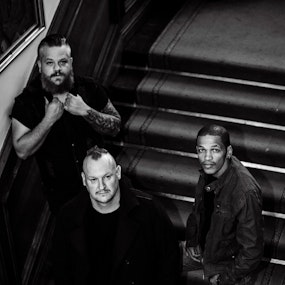
Gage
Gage hails from the historic and dusty diamond mining town of Kimberley, South Africa. Founded by frontman, drummer, singer and songwriter, Jason Horseman in 2007, the band has performed at several local and international festivals to growing numbers of fans.
Featured Episodes
Here are some great episodes to get started with


















